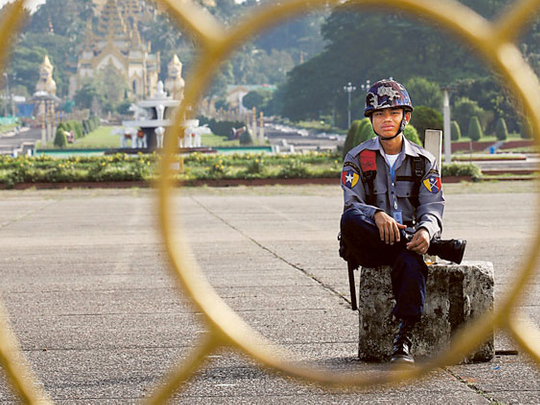
Yangon: Aung Thaw was a teenager when he joined Myanmar’s armed forces, which seized power in 1962 and led a promising Asian nation into half a century of poverty, isolation and fear.
Now 59, he has a new mission as deputy minister of defense: explaining why the military intends to retain a dominant role in a fragile new era of democratic reform.
In a two-hour interview with Reuters, the first by a leader of the armed forces with the international media since Myanmar’s historic reforms began last year, Aung Thaw depicted the military as both architect and guardian of his country’s embryonic democracy.
That’s why the military has no plans to give up its presence in parliament, he said, where its unelected delegates occupy a quarter of the seats. Nor will the military apologise for its violent suppressions of pro-democracy protests in 1988 and 2007 that led to crippling Western sanctions.
“The government is leading the democratisation,” said Aung Thaw. “The Defense Services are pro-actively participating in the process.”
The military will also retain a leading role in Myanmar’s economy through its holding companies, according to the firms, which are among the country’s biggest commercial enterprises.
Aung Thaw’s comments came ahead of Barack Obama’s visit to Myanmar on November 19, the first by a serving US president to the country also known as Burma.
The generals’ reluctance to loosen their grip on power and acknowledge past abuses raises fundamental questions for this strategic country at Asia’s crossroads: Can Myanmar be reborn after decades of dictatorship without the military itself also undergoing profound change? And is the United States too quickly embracing the generals?
“When there is genocide in Darfur,” said President Obama in his Nobel Peace Prize acceptance speech in 2009, “systematic rape in Congo, repression in Burma — there must be consequences.” Three years later, the United States is rewarding Myanmar’s once-reviled military by granting it observer status at next year’s Cobra Gold war games in Thailand. The exercises form part of Washington’s strategic “pivot” to Asia to counter the growing influence of China, traditional patron of Myanmar’s former junta.
Myanmar’s emergence from authoritarianism has been compared to the Arab Spring, but the trigger wasn’t street protests. The opening was stage-managed by retired generals such as Thein Sein, whose dramatic reforms cleared the way for an engagement with the West and a suspension in sanctions. A government now dominated by former generals has begun repairing a dysfunctional economy with foreign expertise and investment.
Since taking power in March 2011, Thein Sein’s quasi-civilian government has relaxed censorship, allowed street protests and held a by-election that put Suu Kyi into parliament. In return, the west has suspended most sanctions, while Japan has promised up to $21 billion in aid and investment. Foreign investors are pouring into one of the world’s last frontier markets.
The military, however, has remained practically a law unto itself, its power and privileges enshrined in a 2008 constitution drafted by the former junta. Fears persist that hardliners may emerge to stall or roll back the reforms.
The generals have long insisted the reforms were the culmination of their “roadmap to democracy” announced nearly a decade ago. However, the country remains shaken by the 1988 pro-democracy protests, when thousands of unarmed protesters were killed or injured by soldiers and Suu Kyi was placed under house arrest, where she would remain for 15 of the next 21 years.
Although the military has so far refused to acknowledge the suffering it caused and faces no institutions powerful enough to compel it to account for its past history, there are signs that things are changing.
The annual intake of cadets at the junta’s training academy has halved to about 1,000. In the past, cadets had little access to the outside world, said an officer, who spoke on condition of anonymity. Mobile phones, the internet and personal computers were banned. Today, cadets can surf the web and bring their own laptops, although mobile phones remain forbidden.
There is also the issue of the recruitment of child soldiers, which the defence ministry has promised end. On September 3, the military discharged 42 underage recruits at a Yangon ceremony attended by UN and international aid agencies. Activists say many child recruits remain in military service.
So there is still a long way to go. Inside the academy, requests to interview cadets and soldiers were turned down. In another remnant of Myanmar’s recent past, plainclothes agents trailed reporters until they had left town.
— Reuters












